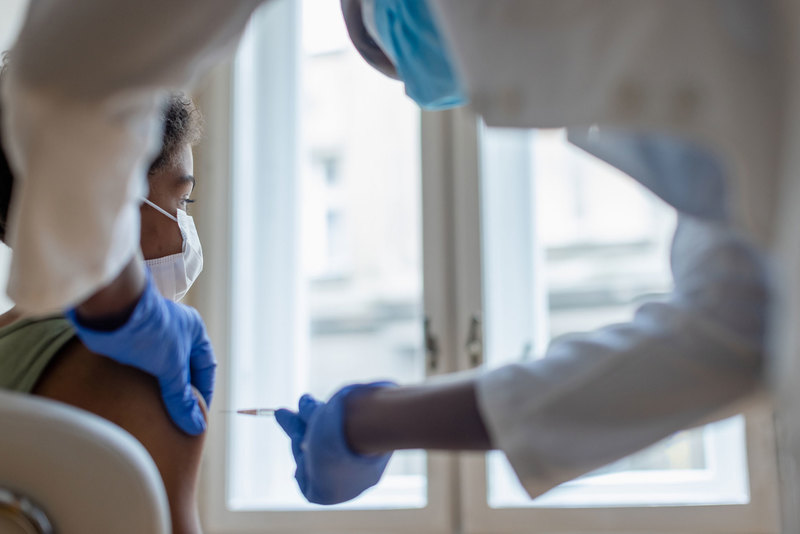Looking through the lens of missed vaccination opportunities
26 March 2024 | Story Kamva Somdyala. Photo iStock. Read time 6 min.
Medical doctor and PhD graduand at the University of Cape Town (UCT) Dr Chukwudi Nnaji aimed to answer three critical questions in his thesis titled, “Assessing and addressing missed opportunities for vaccination in Cape Town through a collaborative quality improvement approach”.
“A missed opportunity for vaccination refers to any contact with clinics, hospitals or any other health service delivery point by an individual (child or person of any age) who is unvaccinated or partially vaccinated (and is free of contraindications to vaccination), which does not result in that person receiving the vaccine(s) for which they are eligible,” he explained.
The questions he aimed to answer are: What is the burden of missed opportunities for vaccination? What are the reasons for the missed opportunities, and what can be done to address them?
“To answer these questions, my research addressed five specific objectives. It started with quantitative and qualitative assessments of the magnitude of missed opportunities for vaccination and multi-dimensional factors associated with missed opportunity occurrences among children aged under two years attending clinics in Cape Town,” Chukwudi said.
“In collaboration with stakeholders, results from the formative assessments were used to co-design and implement a range of clinic-level quality improvement interventions targeted at preventing missed opportunities for vaccinations among children attending those clinics.”
“Findings provide useful evidence for informing current and future missed opportunities for vaccination remedial efforts in primary health care settings in Cape Town.”
He added: “Using a quasi-experimental and controlled design, the next component of the research evaluated the effectiveness of the quality improvement intervention. The final component then used post-intervention evaluation methods to determine the feasibility, acceptability and sustainability of the intervention as implemented. Findings provide useful evidence for informing current and future missed opportunities for vaccination remedial efforts in primary health care settings in Cape Town and in similar contexts.”
Born in Nigeria and currently residing and working in London, Chukwudi’s work focuses on supporting the implementation and evaluation of public health interventions and providing technical expertise for strengthening health systems and improving health outcomes across countries in Africa and Asia. He returned to the Sarah Baartman Hall for his graduation this March, walking away with his degree from UCT’s Department of Public Health and Family Medicine – specialising in epidemiology and biostatistics – in the Faculty of Health Sciences.
Communities
“I often think of public health professionals or epidemiologists as doctors attending to and treating whole communities rather than individual patients,” Chukwudi noted. He said the decision to go this research route was an easy one because his master’s in public health had a vaccine focus. Moreover, his supervisors are global experts in the field of vaccinology.
“Vaccines are undoubtedly one of the most valuable inventions ever known. The World Health Organization (WHO) estimates that immunisation saves the lives of 2.5 million people each year and protects millions more from illness and disability,” he explained.
“Vaccines can only work when people take them, and population coverage is high. Missed opportunities for vaccination are a major contributor to sub-optimal vaccination globally, particularly among children.”
Having started his PhD journey in 2019, the road to completion had interesting moments. For instance, the COVID-19 pandemic, which enforced lockdowns, made data collection onerous. “With early evidence beginning to show the disruptive impact of the pandemic on immunisation and other vital health services, I realised how it had become more important to prioritise efforts to address missed opportunities for vaccination as part of efforts to undo the impact of the pandemic,” said Chukwudi.
“The sheer number of clinics in which we were to recruit research participants at such difficult time made field work [even] more daunting.”
“From that experience, I was able to learn how to adapt and conduct research in operationally challenging settings without jeopardising the quality of the research and actualisation of planned goals.
“The sheer number of clinics in which we were to recruit research participants at such difficult time made field work [even] more daunting.
“It feels incredibly fulfilling to have helped make important contributions to current global and local efforts to understand and address immunisation coverage gaps, of which missed opportunities for vaccinating children are a major driver. I had since my early years in medical school fancied public health and medical research.”
No perfect PhD
It was in his fifth year that he decided to go the public health route and it is through this work that he has been able to improve his ability to analyse and identify public health challenges, conceptualise interventions to address such challenges and design research studies to evaluate the interventions.
His concluding words are of encouragement for prospective and current PhD students: “There is no perfect PhD, however smooth the journey might have been. Looking back, there were certainly many aspects of the PhD experience I am incredibly proud of, as well as those I wish were better. One piece of advice I would give to anyone currently doing a PhD or intending to do one is to cultivate resilience and adaptability. It is important to understand that unforeseen setbacks and constraints are often inevitable.
“I am grateful to have been supervised by an excellent team comprising Professor Charles Wiysonge, Professor Maia Lesosky and Dr Duduzile Ndwandwe, who are highly respected experts and global leaders in the field. I am particularly thankful to my wife, Dr Chisom Akunna-Nnaji, who proved to be motivator-in-chief and a constant pillar of support, especially as the latter half of the PhD was in the early years of our marriage.”
 This work is licensed under a Creative Commons Attribution-NoDerivatives 4.0 International License.
This work is licensed under a Creative Commons Attribution-NoDerivatives 4.0 International License.
Please view the republishing articles page for more information.










